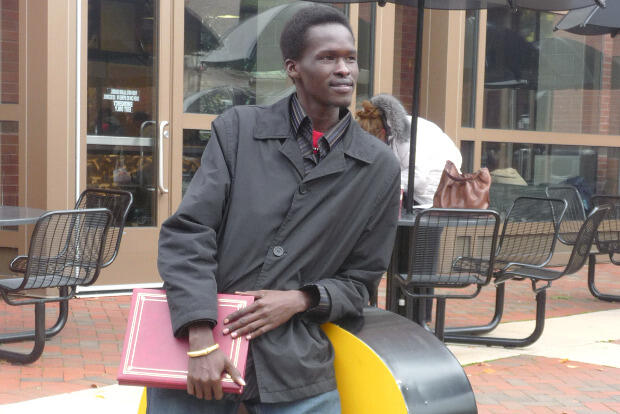
Dec. 9, 2009
Lost Boy of Sudan ready to graduate after long journey
Share this story
The four-bedroom apartment that Awer Bul shares with three other VCU students in Ackell Hall has a kitchen, a living room, a dining room, two bathrooms and a full array of appliances — refrigerator, electric range, dishwasher, garbage disposal, washer and dryer. "It's got everything you need," he says.
In a corner of the living room, near a window overlooking the courtyard, Bul has appointed a small space where he can paint, a sort of informal in-home studio, and the tranquil apartment represents an idyllic contrast to the pieces that he creates there – often vivid works that poignantly recollect the scenes of mayhem and loss he witnessed as a child while living through the Second Sudanese Civil War. From the quiet of the third floor of the West Broad Street dorm, Bul has returned again and again to the harrowing time he spent on the run as a refugee.
The process unlocks his memory: he paints a scene that he remembers and it promptly shakes free a different one that he had forgotten. He paints that new one and another one emerges. It frequently surprises him what is unearthed. He has painted steadily for years, but he believes he has barely touched on what he must address from the four-year period he spent in exhausting, perpetual motion because there is so much contained there.
"I see the life in what I draw," Bul says. "It brings those memories back and I don't want to forget these people – my friends and my family – and I don't want to forget what I went through.”
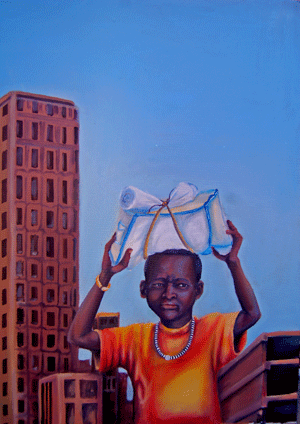
His life since he was on the run – 15 years of comparable calm – is largely absent from his work. One stark exception is a painting depicting Bul in New York City as a fresh arrival to the United States. In the image, Bul, a teenager at the time, uses his hands to balance a package on the top of his head, because, he explains, "I knew I had a lot to carry."
VCU, and the apartment he moved into five years ago, has been a setting of great growth for Bul, but now, happily, that chapter in his life is over. He graduates on Saturday from VCU with a bachelor’s degree in fine arts, majoring in kinetic imaging and minoring in painting and printmaking in the VCU School of the Arts. He moves out of the apartment next week.
Bul is not only the first member of his family to graduate from college – he is the first member of his family to receive any kind of formal education. His brother, who came to the United States with him, and his mother, who he helped bring here five years ago, will be in attendance Saturday, among the thousands in the Siegel Center crowd watching the columns of proud new graduates march onto the arena floor. Those graduates will include at least two other Lost Boys of Sudan, the term used for southern Sudanese boys displaced or orphaned by the war – Jacob Bol and Mawut A. Mawut.
"It's been a long struggle," Bul says. He says it with a grin, though, as though he was just another prospective graduate who has worked through late nights, daunting assignments and inscrutable lessons to finally earn that degree.
Bul was born in southern Sudan in 1983 at the outset of the civil war. He began to paint early in his life, using cow dung to draw images on the walls of his family’s house – much to the dismay of his father. In late 1990, Bul, his family and fellow villagers were forced to flee their village ahead of the northern-based government troops that were taking over their province, Jonglei, village by village. The fleeing group kept on the move, expanding as it progressed, accumulating people from villages it passed through, thickening into congestion. "You can't believe how big the crowd was," Bul says.
The group used a route alongside the Nile River when they could because access to the water was critical in the punishing heat. However, it was the rainy season, too, and the area was flooded, making any movement slow and sometimes, when the water was especially high and rapid, treacherous. Roads were too impassable for relief supplies to be trucked in, and aid workers largely were uncertain of their whereabouts anyway. Occasionally, a U.N. plane dropped bags of rice and grain in the rare instances they spotted Bul's group. The refugees slept under trees when they could but sleep was a luxury. "You couldn't really sleep," Bul says. "I remember I would fall asleep while I was walking."
The refugees hoped to find a better environment in a neighboring province, Equatoria, not realizing that it was even less hospitable than Jonglei. By the time Bul and his fellow refugees arrived, 21 days after their journey had begun, the enemy had already taken over much of the area and was overpowering the remaining southern Sudanese soldiers, according to Bul. He and some of his group then tried neighboring Uganda, but their stay was abandoned after three months because of what Bul calls "the problem of the LRA," the Lord's Resistance Army, which Bul says kidnapped children and forced them to fight as soldiers in that country's civil war. They returned to Sudan.
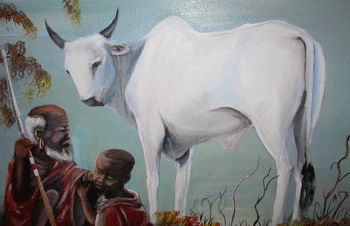
This scenario – traveling from one dangerous spot to another, always moving, fueled by fear – was to become the state of Bul's life for the next few years. In Sudan, the refugees did their best to stay safe by never staying in one place for very long. Bul says they tended to travel at night because enemy ambushes were far fewer then. Still, there were many attacks. In the morning, when the sun rose, they sometimes found dead bodies on the road. An estimated 1.9 million civilians were killed in southern Sudan during the civil war, which ended in 2005 with the signing of a peace agreement, and more than 4 million people were forced to flee their homes.
Malnutrition and starvation were common. Bul himself lost three siblings during his family’s trek. His sister, who was about 19 months old, and twins – a boy and a girl – who had been born five months before the family was forced from the village, each died early in the trip, unable to receive the sustenance and care they needed.
The longer the refugees ran, the younger they became: older men left the group to join the army, which was losing men and needed reinforcements. "That was the only way they thought they could save us," Bul says.
Life on the run allowed only glimpses of normalcy. Bul recalls playing occasionally with other boys, but any fun was tempered and short-lived. Bul used to pretend that the war had abruptly stopped, and he would try to figure out how long it would take him to make his way back home to his previous life.
In 1994, Bul and his parents were separated – his parents were placed in a refugee camp near the Sudanese-Kenyan border while Bul continued to the Kakuma refugee camp in Kenya. He lived there for the next six years. He was much safer but the camp was hardly a serene home. They ate one meal a day, water was scarce, their movements were restricted to the camp and health care was poor.
Art provided his escape. Unable to find a common language with a United Nations aid worker at the camp, Bul painted his story for the worker, demonstrating the destruction that he had witnessed and illustrating his subsequent wanderings. Bul's work moved the aid worker and helped him stand out. Bul was selected to be resettled in the United States.
He moved to Richmond in 2000. Initially, he lived in the Virginia Home for Boys and Girls, but soon he and some other Lost Boys of Sudan moved into an apartment together. Bul attended J.R. Tucker High School and graduated in 2004 – an impressive achievement considering he had arrived in the U.S. without any knowledge of the English language. He was accepted to VCU and moved into his Ackell apartment in December of 2004.
Early in Bul's time at VCU, Bob Paris, a professor in the kinetic imaging department of the VCU School of the Arts, attended a showing in the Student Commons Theater of a documentary film about the Lost Boys of Sudan. Following the film, Bul and other Lost Boys spoke about their experiences. Bul mentioned his desire to make his own films about Sudanese refugees. Paris was impressed with the way Bul handled himself, especially the resiliently positive nature he displayed even when revisiting a painful past, and he approached Bul after the event to offer to help him take classes in kinetic imaging. He told him, “We can help you if you want to be a filmmaker.”
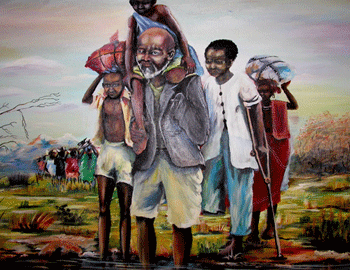
Bul accepted the offer and began taking classes in the kinetic imaging department. He now calls Paris both a mentor and a friend. For his part, Paris says teaching Bul has been a gift. He says any lessons that he has imparted to Bul have been returned to him. Paris says working with Bul is the kind of experience a professor hopes for when he begins to teach college students.
"He is so affirmative," Paris says.
Over the past five years, Bul, who has received scholarship help from the Virginia Home for Boys and Girls and the Linhart Foundation for his studies at VCU, has become increasingly visible in the Richmond area. He has proved to be a vigilant and cogent educator on the impact of the Sudanese civil war – the peace of which is now considered to be faltering again – and the status of the war’s refugees, many of whom remain in camps. Bul has spoken to countless local groups, including a wide variety of school classes.
He also has twice returned to the Kakuma Refugee Camp. The first time, in 2006, he traveled alone with as many art supplies as he could carry, which he had gathered from donors in Richmond. Knowing how much art had helped him cope, Bul was eager to give other refugees an artistic outlet. The supplies were eagerly received. He also snuck back into Sudan during the trip and tracked down his father for a reunion.
Soon after the trip, Bul met Gabriel Williams, a fellow kinetic imaging student. They discussed Bul’s personal history, the situation in Sudan and Bul’s plans to return to the refugee camp with more art supplies. Williams, who had traveled to West Africa a few years before, was so taken with Bul’s story and with his description of the conditions at the camp that he told Bul he would go with him the next time he visited and they would make a film about the camp’s residents.
“Getting to know Awer and his artwork, his drive and his dedication, made me want to do something,” Williams says.
It might have seemed at the time like a fleeting notion that would be voiced and soon forgotten, but Williams followed through, taking the lead on preparing the application for a grant for undergraduate students offered by the VCU School of the Arts and helping to raise additional money to fund the trip.
Williams then endured the difficult conditions that took them to the refugee camp itself. Once in the camp, Williams occasionally worked alone filming residents while Bul met with family members that lived there. “It was exhilarating to see him with his family,” Williams says. “You could see they were very happy to see him and very proud to see him come back.”
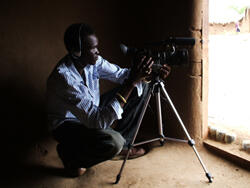
Paris says that Bul and Williams, who graduated from VCU in 2007, were an ideal match for the Kakuma film project. Both, he says, brace their work and lives with a strong social sensibility and awareness. Bul says Williams’ dedication to his cause – he was in Kenya for more than 30 days – and the trust that he showed in him by volunteering for the project staggered him.
“To meet a person like him who would take this risk with me – go with me on this trip and believe in me – was something that really touched my heart,” Bul says. “I can’t believe he did that.”
Their collaboration resulted in the film, “Blood is the Same,” which was shown to 500 people at the Virginia Holocaust Museum in January. Bul and Williams also brought back paintings that Kakuma residents had painted with the donated supplies. The paintings were displayed in the museum.
In order to return to the Kakuma Refugee Camp for those two trips, Bul battled bureaucrats, bribed corrupt police officers and endured days-long rides through the desert in cramped buses with no air conditioning or restrooms. This to reach a place with abundant crime, no electricity, scant supplies, grim ramshackle homes, poor hygienic conditions and scorpions in the outhouse. Not to mention the unpleasant memories he retained from his life at the camp.
Most, having escaped such a place, would scoff at the idea of ever voluntarily going back, especially at the certain cost of much effort and anxiety and the potential cost of something more. And yet, when Bul speaks about the refugee camp, he sounds wistful, as though he cannot wait to return. It’s emblematic of his determination to help those he left behind.
Bul works diligently on the technical details of art, whether it is filmmaking or painting, but Paris says that Bul's artistic pursuits are characterized most by what he hopes his work can accomplish. "He believes that art can be a tremendous agent for social change," Paris says.
"With Awer it's kind of an essential truth," Paris says. "He sees art as a universal language — a language that is probably connected to the heart."
Paris says Bul’s intense drive to learn and improve as an artist is linked directly to his desire to make an impact.
"He's learned a lot of survival skills through his journey and ordeal," Paris says. "He's often speaking about ‘how can I go where I want to go.’"
Through his work and his advocacy, Bul says he feels as though he becomes a part of the people he reaches. He is still considering how he will find that connection after graduation. He will work on the nonprofit organization that he helped create, United Families for Sudan, which is dedicated to promoting health care, education and economic development in southern Sudan. He hopes the organization soon will be able to fund the installation of a new well in a village in southern Sudan, supplying badly needed clean water. Bul is thinking about graduate school, too, perhaps in art or media or public administration.
"Knowledge is given to you so that you can give it to others," Bul says. "I have to do something to show people what I have learned.”
Subscribe to VCU News
Subscribe to VCU News at newsletter.vcu.edu and receive a selection of stories, videos, photos, news clips and event listings in your inbox.










